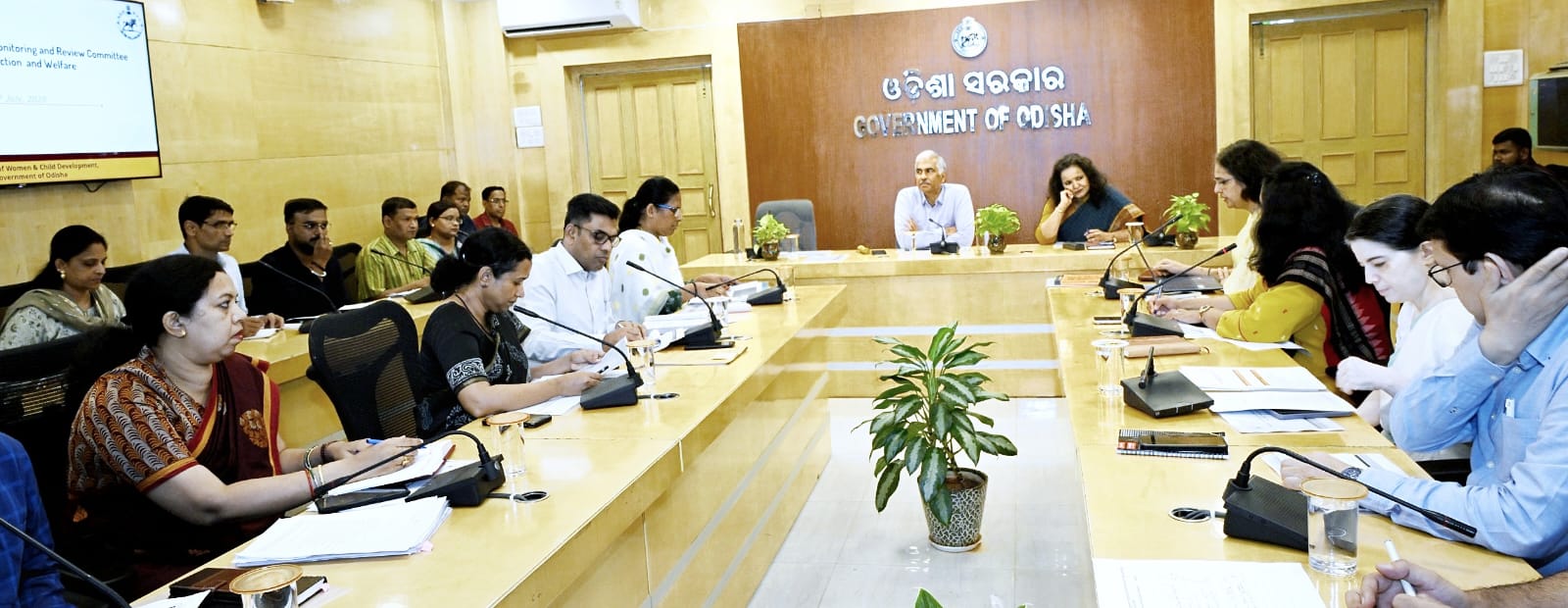

Bhubaneswar, July 24: A meeting of the State-Level Child Protection and Welfare Monitoring and Review Committee was held at Lok Seva Bhawan under the chairmanship of Chief Secretary Manoj Ahuja today.
The meeting focused on reviewing the institutional and non-institutional frameworks for child protection and care in Odisha and strengthening convergence among various departments and stakeholders.
The meeting discussed in detail the ongoing schemes, government mechanisms, and contributions of NGOs and institutions working in the field of child protection. Special emphasis was laid on effective implementation of the Government of India’s Mission Vatsalya in Odisha.
Monisha Banerjee, Director of Women and Child Development, made a comprehensive presentation on various institutional and non institutional arrangements for child protection in the state. Key national and State-level bodies such as the Mission Vatsalya Approval Board, Mission Vatsalya Central Project Monitoring Unit, State Child Protection Society, State Adoption Resource Agency (SARA), and the three-tier Child Welfare and Protection Committees at State, district, and Gram Panchayat levels are actively functioning in the State.
At present, Odisha has 30 District Child Protection Units (DCPUs), 31 Child Welfare Committees (CWCs), 34 Juvenile Justice Boards (JJBs), 36 dedicated Juvenile Police Units, and 220 Child Care Institutions (CCIs). About 8,150 children are under institutional care while 6,317 children are under non-institutional care.
The adoption trend in Odisha has shown steady growth over the past three years. Due to awareness, streamlined processes and strengthened systems in-country adoption has increased, with the adoption of girl children exceeding that of boys each year. Odisha has 160 children’s homes, 33 specialised adoption agencies, 12 open shelters, 7 observation homes, and 7 special homes.
Of 8,150 children in CCIs, 98% have been enrolled for Aadhaar. Currently, 672 children are pursuing vocational education and 8,130 individuals have undergone training through 264 different programmes. While 211 children have secured employment, 79 have become self-employed.
The state also provides marriage assistance to children leaving institutional care. Currently, 41 Child Help Units/Help Desks and the State Control Room are functioning effectively to extend support to children in need. Financial assistance under the Ashirbad Yojana is being provided to eligible children. Forging a unified, rights-based Adoption Strategy to strengthen family-based care and accelerate adoptions in Odisha, Adoption Conclave 2025 was held in May 2025.
Other key focus areas discussed included mental health support and counseling for traumatized children, smart education through e-learning, video conferencing facilities for Juvenile cases hearings, monthly financial aid for continuing education under Ashirbad Yojana, and encouragement of sports and cultural activities through initiatives like the State-Level Mahak and Utsah programmes.
There was a detailed discussion on yoga sessions conducted in child care institutions, exposure visits and training programmes to World Skill Centres, and vocational training for children in observation homes.
For prompt child protection assistance, Child Helpline 1098, Women Helpline 181, and Emergency Response support system 112 have been integrated. The effective functioning of Child Helpline 1098 in all districts was highlighted by Principal Secretary, Women & Child Development, Mrs. Shubha Sharma, who presented the status.
Under the Yashoda Scheme, orphan surveys are conducted every four years. The Amari Shishu Portal is being operationalized to update all child care and protection data digitally. So far, over 51,000 children have been covered under the Ashirbad Yojana and are receiving various benefits and assistance. Plans for setting up Child Help Centres at railway stations and bus stands were also discussed.
The Chief Secretary emphasized strengthening institutional and non-institutional mechanisms for child protection and care through collective efforts of all departments, including Women & Child Development, School & Mass Education, Higher Education, Health& Family Welfare, Panchayati Raj&DW, Home, Skill Development and Technical Education.
The Chief Secretary also directed district-level monitoring to be made more active and child care institutions to work with greater commitment and accountability.
Additional Chief Secretary & Development Commissioner Anu Garg advised Secretaries and senior officers of various departments to visit schools and child care institutions during their district tours.
Prinicpal Secretaries, Commissioner-cum Secretaries, and senior officials from various departments attended the meeting.